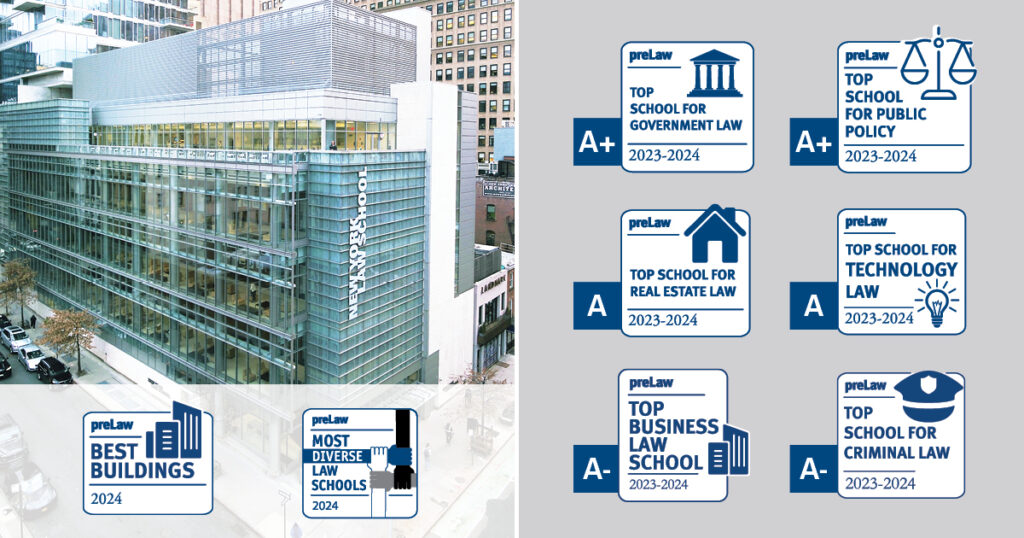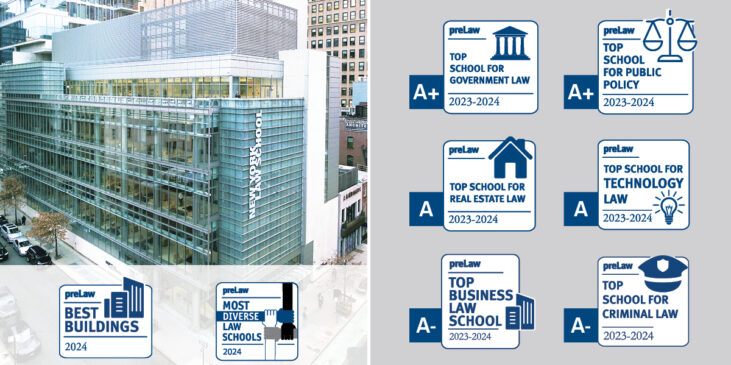
New York Law School (NYLS) is proud to have been awarded top grades in government law, public policy, technology law, and real estate law in preLaw magazine’s Winter 2024 issue, and in business law and criminal law in preLaw’s fall issue. The magazine also recognized NYLS for our impressive campus in the iconic Tribeca neighborhood and named the School among the “Best Law Schools for Diversity” in its latest issue.
One of the Best Law School Buildings
New York Law School has been part of the fabric of the vibrant Tribeca neighborhood for more than 130 years. The students who walk through the doors of the iconic Abbey Hall, NYLS’s main academic building, are only steps from the courts, government agencies, Wall Street businesses, law firms, tech companies, and many of Lower Manhattan’s notable cultural sites. See for yourself with a special virtual tour, narrated by Dean Anthony W. Crowell, or join us in person to take a look around campus.
Among the Most Diverse Law Schools
For their “Best Law Schools for Diversity” lists — broken down by ethnicity — preLaw grades schools based on their percentage of students who identify as a member of each ethnic group, the percentage of professors at each school from ethnic minorities, and each school’s diversity services. NYLS is proud to be named on the Best Schools for Asian Students and Best Schools for Hispanic Students lists.
As “New York’s law school,” we are committed to ensuring that our institution reflects the diversity and excellence for which New York is known. The Office of Diversity, Equity, and Inclusion supports students, administration and staff, faculty, and alumni in addressing all aspects of diversity, with a focus on underrepresented communities and military veterans. And students can find community in any number of our 20+ active student associations, which welcome all members of the School community and work to create a space for members to feel seen, comfortable, heard, supported, and to have access to all the resources they need to succeed.In the rankings, preLaw gave NYLS especially high marks for the impressive range of services available to all of our students, which includes tailored academic and career guidance through the Office of Academic Planning and Career Development as well as individual coaching and feedback for students, first-year and upper-level skills courses, and skills development workshops through the Office of Academic and Bar Success Initiatives.
Nationally-Ranked Academic Programs
NYLS continues to provide law students with an innovative education and them offer exceptional experiential learning opportunities. preLaw magazine has awarded the School top marks in these practice areas.
Government Law and Public Policy: “A+”
NYLS’s prime location in the heart of New York City’s government centers, partnerships with key public policy institutions, and strong connections to state and local government leaders position the School as a leader in government law and public policy, which gives students unparalleled access and connection to local, state, and national activities.
The School is home to a broad array of faculty and staff who have had distinguished careers in public service, many in the highest ranks of state and local government. NYLS also hold the distinction of having the second-highest number of placements nationally in gold standard public sector attorney positions, just ahead of Georgetown University Law Center.
NYLS’s Center for New York City Law is a community of law and policy experts with a focus on creating an open window into New York City government. Its popular CityLaw Breakfasts — a monthly breakfast series — features state and local government officials discussing high-profile public policy issues and is attended by hundreds of influential lawyers, policy experts, and public servants. The Wilf Impact Center for Public Interest Law also offers a broad array of nationally-recognized programming, coursework, public policy and advocacy initiatives, and clinics that promote the practice of and expand the role of public interest law while providing law students opportunities to advance social justice.
Students can gain valuable hands-on experience through specialized government and public policy externships such as our Washington, D.C. Honors Externship and Gotham Honors Externship in New York City. And the NYLS Office of Public Service and Pro Bono Initiatives provides personalized academic and career advising to students pursuing government and policy roles and coordinates networking events for students.
It’s impressive opportunities like these that encourage students like Alexandra Ogunsanya ’24, a 3L Day Division student and Wilf Impact Scholar at NYLS, to attend the Law School, as she shares in a feature article “Acceptance Time” in the Winter 2024 preLaw issue. As Ogunsanya was considering her options, she ultimately chose New York Law School because it “felt like the best place for her to pursue a career in public interest law.”
Real Estate Law: “A”
The Center for Real Estate Studies (CRES) leads NYLS’s academic programs in real estate law. CRES offers a broad selection of courses, advanced seminars, independent study projects, and externships in governmental offices and real estate firms. CRES’s programming reflects current concerns about ensuring environmental sustainability, creating affordable housing, preserving historical landmarks, safeguarding the financial stability of the residential and commercial mortgage markets, and assessing public costs and social justice issues arising from development. The Center also fosters an open dialogue around the mortgage and secondary mortgage market, landlord/tenant issues, co-ops and condominium development, financing and management, and intensive development of land resources. Law students involved in CRES’s programs and scholarship gain valuable practical experience and build an extensive network for future employment in real estate.
Technology Law: “A”
NYLS is at the forefront of technology law, led by the School’s Innovation Center for Law and Technology. The Center offers cutting-edge courses like LegalTech, Legal Operations, and the Future of Practice, which examines the areas in which legaltech is changing the practice of law in areas such as e-discovery, legal operations, and privacy/security. Extensive experiential learning courses are also available, like the Patent Law Clinic, which recently secured a patent for a first-time inventor. In addition, the Center creates pioneering programs that promote career pathways in a wide variety of areas at the intersection of law and technology, including digital transformation of the legal profession and the growth of technology-driven fields.
Business Law: “A-”
The School has long been established as a business law leader for its impressive programs through the Center for Business and Financial Law, which enable students to participate in cutting-edge research projects, attend special events and programming, and take advantage of the School’s extensive network of business leaders. New institutes within the Center like the James Tricarico Jr. Institute for the Business of Law and In-House Counsel and the Ronald H. Filler Institute for Financial Services Law provide a range of opportunities in in-house counsel and financial services law education for law students and practitioners. The School also offers standout experiential learning opportunities like the Securities Arbitration Clinic and the Mini M.B.A. program.
Criminal Law: “A-”
NYLS’s comprehensive criminal law program, which includes robust coursework mixed with extensive real-world experience, helps law students sharpen their practical legal skills. Students can work directly with police officers, victims, and witnesses to prosecute misdemeanor cases through the School’s two Criminal Prosecution Clinics, which partner with the Manhattan and Brooklyn District Attorney’s Offices. Students can also work with The Legal Aid Society to represent low-income defendants in misdemeanor cases from arraignment through trial in the Criminal Defense Clinic. NYLS institutes such as the 21st Century Policing Project (P21) and the Criminal Justice Institute provide students ample additional opportunities to address the defining challenges of our current systems, and prepare them to lead on issues of policing and criminal justice. And NYLS continues to expand opportunities to engage with restorative justice efforts through new courses, externships, and education and advocacy work.

